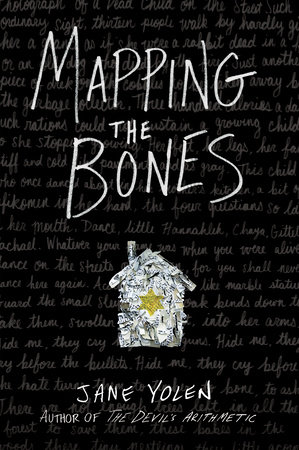
Mapping the Bones
Ebook
$7.99
More Formats:
- Pages: 432 Pages
- Publisher: Penguin Young Readers Group
- Imprint: Philomel Books
- ISBN: 9780698175112
An Excerpt From
Mapping the Bones
Such an ordinary sight, thirteen people walk by,
hardly giving her a glance
as if she were a rabbit dead in a field,
or an old dog who died by the fire.
Just another piece of drek on the cobbles
to be taken away by the garbage collector.
Three hundred calories a day, such rations
could not sustain a growing child,
so she stopped growing.
Her feet, her legs, her face stiff and cold
like pavement, and as gray.
This child who once danced
about in her mother’s kitchen,
a bit of afikomen in her hand,
the four questions so lately in her mouth.
Dance, little Hannahleh, Chaya, Gittel, Rachael.
Whatever your name was when you were alive,
dance on the streets of Heaven,
for you shall never dance here again.
—Chaim Abromowitz
Chaim was thinking too much about the words he would have to find to convince Motl, so he wasn’t paying careful enough attention to the man in front of him, a nondescript, hunched-over, dark-coated scarecrow. A man who turned to the right to avoid a pile of rags. Chaim only saw him at the last moment.
Cursing silently at his own carelessness, Chaim checked his forward movement and only barely avoided stepping on the pile. He was deathly afraid he might get tangled in the rags. There was a soldier standing on the corner who might have noticed him then.
A soldier.
With a gun.
For a moment, he thought, Rags can be useful. Mama could always sew Gittel a new skirt with those rags. Or Papa a warmer shirt, and maybe that would help with his cough. In the ghetto it had come to this—ragpicking.
However, he didn’t dare bend over or slow down, so he just made a quick hop-step to the right. But as he glanced at the bundle from the corner of his eye, he realized why the man had stepped around it rather than simply trod on it.
The thing wasn’t actually a bundle of rags, but a small girl, maybe five or six, in a washed-out blue head scarf, threadbare blue dress, and a scruffy coat with the requisite yellow star on the sleeve. She lay curled up on the ground, one scrawny hand held out as if begging, the other clutching a doll as ragged as she. But her mouth was open, her eyes wide, unblinking. There was a bullet hole in her forehead that looked like a third eye. A dark bruise on her upturned cheek.
Gittel had such a dress once, he thought. That blue.
Even as he walked on, his eyes filled with tears. A line of a poem sledgehammered into his startled mind. Dance on the streets of Heaven, for you shall never dance here again. It was so complete, he wondered if he’d read it somewhere. He often had such things in his head—words that sang but were never spoken aloud. Words that he wrote down in his journal. So he wouldn’t forget. Though he doubted he could forget this little girl, that line.
And then he shook himself. Thinking of poetry when she lay dead behind him was awful. Unforgivable. For a brief moment, he wondered if he was turning into a horrible person. Yet he walked on. He had to walk on.
He’d never actually seen someone dead before, though he’d overheard people in the apartment building talking about them. Most had been shot or beaten to death and left on the street like a piece of garbage. But this was only the third time in a year that he’d been out on the street alone. Papa and Mama had insisted, and he and Gittel obeyed, of course. Though they were allowed to walk up and down the stairs in the apartment, even run along the hallways for exercise.
But who would shoot a little girl? He bit his lip. Who would beat her? It made no sense, and suddenly—for the first time since they’d been moved into the ghetto—a real, deep-rooted fear invaded him. Maybe because he was alone on the street, even in the midst of a crowd. Maybe because the girl was so young. Maybe because she could be mistaken for rags. Trod upon, kicked to the gutter, because no one had claimed her. Maybe all of those things.
That could be Gittel, he thought. Or the new girl, Sophie. She didn’t seem so bad. He was no longer worried about himself. He kept walking.
He was already almost a block away from her now, moving as quickly as was possible in the ghetto, as if her death were a disease he might catch.
And then he dared a glance back, asking himself if he should just go back and pick her up and take her to the nearest house. Or nearest alley.
But which house? What alley? And how could he explain the dead girl to anyone? He could hardly explain anything to his own family.
The soldier on the corner was watching. Chaim could see that out of the corner of his eye, though he was careful not to swivel his head to look.
He stared grimly down at his feet, realizing that he knew neither the dead girl’s name nor where she lived. She could be Irena or Hannah, Chaya, Rachael. All he knew about the girl was her death. And her doll.





